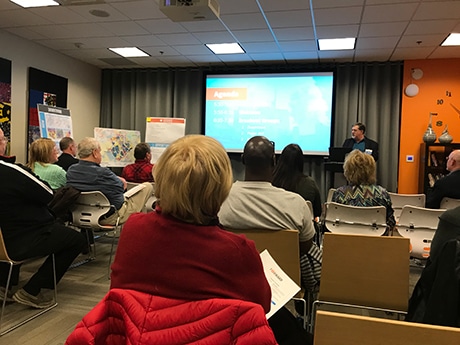
The Midtown Atlanta-based consulting firm, Jacobs, facilitated the evening’s meeting. The interactive event provided a gallery walk where guests could see poster displays of results from the transportation survey, the existing conditions report, and a draft vision for the city. The proposed statement, “Lawrenceville will be known as the heart of Gwinnett and the college town of tomorrow, where inclusion is a way of life, new urban living is just living, and art comes to life in a talent-rich, regional epicenter of community.”
The project team provided an overview of the 2040 Comprehensive Plan and draft revisions of the zoning ordinances to date. Three parts of the city were the main topics of discussions that included the Downtown, Paper Mill, and Maltbie areas. The audience was divided into three rotating breakout groups that identified issues and opportunities for those parts of the city.
“I’m here because I’m concerned about the community in every aspect,” said Lawrenceville resident, Selené Scurry. “I’d like to see more of these kinds of meetings. I want to see more access and opportunities to good jobs in the city.”
Council members in attendance included Tony Powell, David Still, and Keith Roche. Former City of Lawrenceville councilwoman, Marie Beiser commented, “I was very impressed with everyone’s ideas about what could be done around the three focus areas in the city. It was interesting to hear from the residents in the Paper Mill area that they would like it to remain quiet and residential, without the addition of businesses and restaurants along that corridor.”
City of Lawrenceville Existing Conditions Report – Fast Facts:
– The city is expected to add more than 11,000 new residents by 2040.
– 10% of Lawrenceville employees live in the city.
– There are nearly 8,600 companies in town.
– The College Corridor project will connect Georgia Gwinnett College to Downtown Lawrenceville with a linear park and bike lanes.
– There is no public transit on the eastern side of the city.
– The transportation survey revealed that almost all participants (96%) get around in their own cars, 23% walk, 5% use rideshare, and 1% carpool.
For more information about the City of Lawrenceville’s strategic projects, meeting minutes, community surveys and findings, visit: www.lawrencevilleforward.org.

